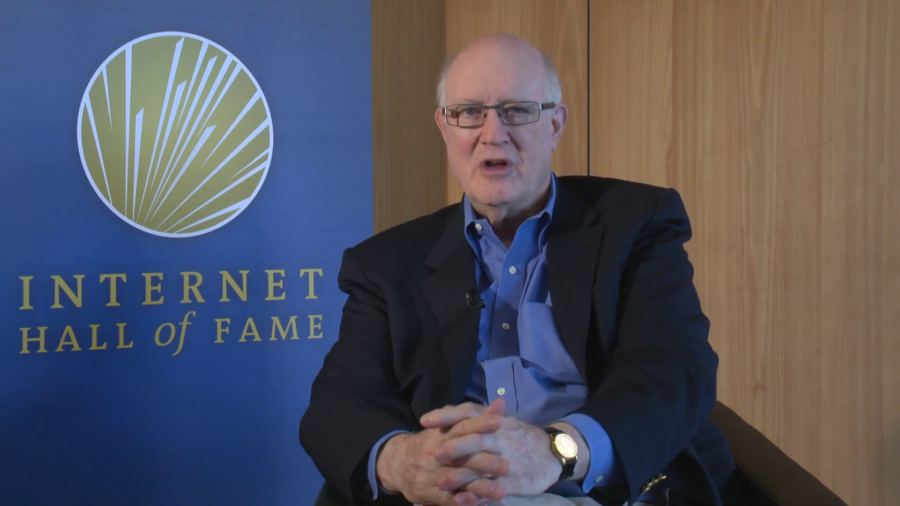Hi, my name is Steve Crocker. Today I run a small company, Shinkuro, Inc., and I’m chairman of the Board of Directors of ICANN. I’ve been involved with the Internet Society for virtually its entire life. Years ago, I had the good fortune to be involved with the early days of the ARPANET and played a small role in helping build some of the technology, and in building some of the social structures that brought everybody together.
So, looking back, my proudest achievements start of course with my children. And I have to credit a successful marriage, at least one that’s still in place. But from a technical perspective, being involved with the development of the Internet is absolutely one of the most rewarding and pleasing experiences I’ve ever had.
So, the Internet is a very very big operation. And with respect to my particular role and particular achievements, the results of things that I was responsible for started out in a very modest and sort of unintended way. I was part of a small group of graduate students at the first four sites of the ARPANET: UCLA, SRI, University of California Santa Barbara, and University of Utah. And we were handed the task of trying to figure out what to do with this network that was going to be given to us, or imposed on us depending upon your point of view. And so we had to organize from scratch. And it was an interesting technical challenge. Open field. I mean, no direction. We knew the basics of what the capabilities were going to be, but there was no requirement that said you have to do this, you have to do that with it. So we had to try to figure out what to do.
And that led to two things. It led to an approach, that has become extremely important, of open architecture and of careful layering so that people can build on top of what other people had done. We were extremely conscious that we had no idea about all of the things that need to be done, but we knew that there would be many interesting things. And so we wanted to to provide building blocks that other people were going to use as opposed to a complete finished system that would have everything. That was one side of it.
The other side of it was, as our ideas started to percolate we knew we had to write them down, and we also knew that the mere act of writing them down was going to trigger some reaction. And possibly even a negative reaction. We were just graduate students. Nobody put us in charge. We had no authority. And it fell to me to organize these notes that we had decided that we were going to write, and I found myself extremely nervous that as I said the act of writing these notes might trigger a negative reaction.
So I hit upon this silly trick of saying well, we’ll just call every one of them, no matter what they are— They might be super formal or they might be completely informal. But we’ll just call every one of them a “request for comment,” as a matter of form. And I thought that this was a temporary device that would last a few months until the network was built and we had organized manuals and documentation and so forth.
So here we are more than forty years later, Requests For Comments are still the lingua franca for the standards process. “RFC” is in the Oxford English Dictionary. And in personal terms, my involvement in the network was a distraction from what I thought was a more serious research agenda. And my involvement with the RFCs was a minor administrative chore related to the network. And yet that’s the only thing I’ll be remembered for.
So, I’m extremely positive about the future of the Internet. I think as good as it has been, there are a number of very positive steps to go. There are some negatives. The security issues and spam and phishing and so forth. And they’re non-trivial. We’ve got to deal with them and fix them over time. But on balance I think that we’re going to see even more payoff from the Internet than we have seen today. Everything will be connected. And there will be… It’s fun to make predictions. So, one of the predictions is the Internet will, in a way, submerge and stop being so visible, and just be part of everything.
So, if I had do offer up some advice to current generations and future generations, I would say get involved, and get involved from the point of view of enabling other people. Of being of service as opposed to trying to do something that is ego-driven or all about trying to grab fame or fortune. The thing that was very evident to me when I first got involved was that this was not a one-man or every person for himself sort of thing—that it really was a group effort.
And that’s worked out enormously well. It’s brought enough financial reward. It’s bought enough attention. And better than either of those, it’s brought quite a bit of personal satisfaction, partly by seeing what I was able to help create. And partly just because it’s been a great ride. I mean, it just hits on every cylinder: entertainment, and sense of satisfaction, and personal gratification to have been there. So I would say to anybody who’s getting into it, come with that attitude that you want to be helpful to others, and genuinely, and that you want to help others succeed. And very good things will happen.
